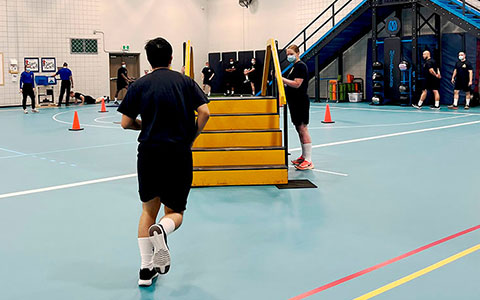Week 1: First steps
Unit orientations

Cadets arrive at the RCMP Academy, their new home for the next 6 months. They spend the first week finding their bearings around base and adapting to a quick-paced training environment. They also meet the rest of their troop. Each troop has up to 32 cadets from across Canada who live and train together. Like a family, they also support each other through Depot.
Like the training weeks to come, the daily schedule this week is full. There are many introductions, including a welcome from the Commanding Officer of Depot Division. Cadets also meet their facilitation team and receive an overview of what to expect. The troop also meets Health Services, the RCMP Chaplain, the Cadet Resource Liaison and other supports available to them.
The RCMP posts successful cadets to detachments across Canada. The staffing unit meets with the troop in week 1 to discuss the needs of the organization and how the staffing process works. Cadets receive their postings after week 17.
PARE #1

During the first week, cadets take the Physical Abilities Requirement Evaluation, or PARE, for the first time. The PARE is a fitness test that cadets challenge 3 times during training. It is a timed obstacle course that simulates physical challenges members face.
By the time they graduate, cadets must complete it in 4 minutes or less.
It opened my eyes to the things I needed to work on, and that running for a long time was not enough preparation.
Introduction to Drill

Drill — it's more than marching and is all about the team spirit!
The Drill and Deportment program is an important component of training. It helps cadets cultivate pride, attention to detail, respect, proper etiquette and protocol in given settings. Above all else, it fosters teamwork, known around Depot as esprit de corps. Drill is all encompassing and exemplifies the Core Values of the RCMP.
During the first Drill lecture, cadets learn dorm rules, including how to set up their living quarters and how to store and display their uniform and equipment. At the end of week 1, cadets attend their first drill class. It's an eye-opening experience for all.
Cadets are also assigned troop duties. These include being a troop liaison, joining one of the various committees, playing in the Depot band and other duties. With all the moving parts during training, cadets quickly learn that everyone has a role to play and working together makes the troop stronger.
Evolution of policing
We start right from the beginning. During the first week of training, cadets learn about the history of the RCMP and how policing has evolved since 1873. Cadets explore the factors that influenced change and how these changes affect policing services.
Cadets learn that the evolution of policing is continuous. As a result, training is on-going and dynamic throughout their career. In today's climate, community-based policing forges a modern, trusted and inclusive RCMP.
Highlights
Kit Issue #1: Boots, doubling
When cadets arrive at Depot, they do not wear their uniform boots right away. Instead, they wear runners, and have to "double" everywhere. Doubling is an accelerated march at a cadence of 180 beats per minute.
Drill takes the lead on teaching the marching movements. Once cadets have become proficient in these skills, they earn the privilege to wear their shiny new boots around Depot!
Depot spotlight: Stores
Stores equips cadets with all the kit and clothing they need for training. Cadets will visit stores several times during their training, and it all starts in week 1.
The first kit issue is quite elaborate and includes everyday working uniform items, as well as a judo gi.
RCMP Longitudinal Posttraumatic Stress Disorder (PTSD) Study
Mental health is essential for over-all health and wellbeing. Public safety personnel, like police officers, are at an increased risk of developing symptoms related to mental disorders. The RCMP has partnered with the University of Regina to help increase awareness and understanding of operational stress injuries.
Cadets have the opportunity to participate in this innovative and important research. Participants join the research at the start of training to gather baseline data before they work in the field. This study has the potential to advance the way we track, assess and treat mental health in the RCMP.
- Date modified: